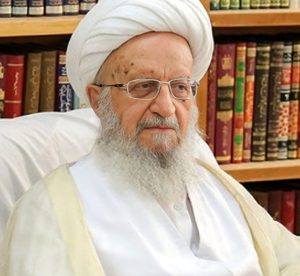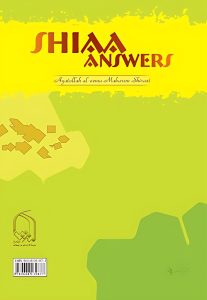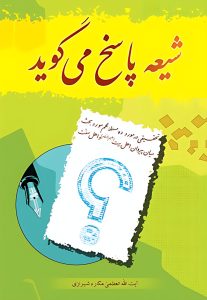Nāṣir Makārim Shīrāzī, Shīʿa Pāsukh Mīgūyad [The Shiʿa Answer], 11th ed., 1 vol., Qom: Imām ʿAlī b. Abī Ṭālib Publication, 1387, 272 pp.
 The history of Shiʿa-Sunni relations, as the most important Islamic denominations, has experienced many ups and downs. While in some periods of history, differences have led to wars and conflicts, in recent decades, with the efforts of some prominent Shiʿa and Sunni scholars, unity among all Muslims has been emphasized. Despite these efforts, the realization of the ideal unity between Shiʿa and Sunnis requires more extensive efforts and measures from the elites and the public. In the meantime, one should not neglect the enemies’ plans to destroy unity by creating suspicion and discord. One of the important strategies of the opponents of unity is to attribute false beliefs to Shiʿa and Sunnis. As the history of inter-religious and intra-religious dialogue shows, ignorance of the beliefs of other religions and sects has been one of the serious obstacles on the way to dialogue. For this reason, it is absolutely necessary to write books to clarify the facts and answer misunderstandings. Shīʿa Pāsukh Mīgūyad by Ayatollah Nāṣir Makārim Shīrāzī is an effort in this regard.
The history of Shiʿa-Sunni relations, as the most important Islamic denominations, has experienced many ups and downs. While in some periods of history, differences have led to wars and conflicts, in recent decades, with the efforts of some prominent Shiʿa and Sunni scholars, unity among all Muslims has been emphasized. Despite these efforts, the realization of the ideal unity between Shiʿa and Sunnis requires more extensive efforts and measures from the elites and the public. In the meantime, one should not neglect the enemies’ plans to destroy unity by creating suspicion and discord. One of the important strategies of the opponents of unity is to attribute false beliefs to Shiʿa and Sunnis. As the history of inter-religious and intra-religious dialogue shows, ignorance of the beliefs of other religions and sects has been one of the serious obstacles on the way to dialogue. For this reason, it is absolutely necessary to write books to clarify the facts and answer misunderstandings. Shīʿa Pāsukh Mīgūyad by Ayatollah Nāṣir Makārim Shīrāzī is an effort in this regard.
Ayatollah Nāṣir Makārim Shīrāzī is a contemporary Shiʿa scholar and Marjaʿ who was born in 1927 in Shiraz, Iran. At the age of 24, he received the permission for ijtihād from Muḥammad Bāqir Iṣṭahbānātī and Muḥammad Ḥusayn Kāshif al-Ghiṭaʾ. Among his publications, one may refer to Tafsīr-i Nimūna, Payām-i Qurʾān, Mafātīḥ Nuwīn, and Anwār al-Fiqāha.
As the subtitle on the book suggests, this work is a research on 10 important issues discussed among the followers of the Ahl al-Bayt (a) and Ahl al-Sunna. According to Makārim Shīrāzī in the introduction, this book has presented an innovative method to strengthen Shiʿa-Sunni unity. Based on this, the important points of difference between Shiʿa and Sunnis have been explained based on the famous Sunni sources. In other words, it is shown in this book that what some extremist groups raise against Shiʿa beliefs is not true, since all these beliefs can be proven based on authentic Sunni books. Based on this, the book consists of ten chapters, each of which deals with one of the disputed issues. The subject of the first, second, third, fourth and tenth chapters is theological, and the subject of the other chapters is jurisprudential.
 The first chapter is about the controversial issue of the distortion of the Holy Qurʾān. The author states that despite some misunderstanding, the Shiʿa, based on rational and narrative evidence, believe that the Qurʾān that is in the hands of all Muslims today is exactly the same Qurʾān that was revealed to the Prophet and not a single word has been added to it or decreased from it. To prove this claim, Ayatollah Makārim Shīrāzī cites verses from the Qurʾān such as 15:9 and 41:41-42 and narrations from the Ahl al-Bayt (a). He also argues that the large number of scribes and memorizers of the Qurʾān in the age of the Prophet and the position of this Divine Book among Muslims throughout history eliminates any possibility of distortion.
The first chapter is about the controversial issue of the distortion of the Holy Qurʾān. The author states that despite some misunderstanding, the Shiʿa, based on rational and narrative evidence, believe that the Qurʾān that is in the hands of all Muslims today is exactly the same Qurʾān that was revealed to the Prophet and not a single word has been added to it or decreased from it. To prove this claim, Ayatollah Makārim Shīrāzī cites verses from the Qurʾān such as 15:9 and 41:41-42 and narrations from the Ahl al-Bayt (a). He also argues that the large number of scribes and memorizers of the Qurʾān in the age of the Prophet and the position of this Divine Book among Muslims throughout history eliminates any possibility of distortion.
Taqiyya, defined by the author as hiding one’s beliefs from his enemies in times of danger, is the theme of the second chapter. After explaining the differences between taqiyya and hypocrisy, the rationality of taqiyya is explained, and then verses 40:28, 3:28 and 16:106 and traditions from Sunni sources are mentioned as narrative reasons for it. It is also emphasized that taqiyya has different rulings in different situations and therefore, it is sometimes forbidden.
One of the important differences between the Shiʿa and Sunnis is their approach to the Companions of the Prophet. While the Sunnis consider all the Companions righteous and just, the Shiʿa believe that being the Companion of the Prophet does not in itself make anyone holy, and each of the actions of the Companions must be measured in accordance with religious criteria, and on this basis, their wrongdoings should not be justified. In the third chapter, Makārim Shīrāzī deals with this topic in detail. His important question is who is basically called a companion of the Prophet; a question that Sunnis do not have a common answer to. To prove the justice of the Companions, verses from the Qurʾān such as 9:100 are cited, but the author considers this argument incorrect, and on the other hand, he refers to several verses from the Qurʾān such as 3:155, 49:6, 9:58, and 33:12-13 which openly condemn some companions. In another part of this chapter, narrations and historical evidences are mentioned which specify some unforgivable sins and mistakes of some Companions.
 The next chapter, after proving the permissibility of visiting graves and making buildings on them, emphasizes its difference from polytheism, and specifically, discusses the permissibility of visiting graves by women. The sixth chapter is related to the issue of temporary marriage. First, 5 reasons for its necessity are listed, and then the Qurʾānic verses and narrations in Sunni sources are elaborated in detail for its permissibility, and it is proved that this ruling, which was permissible according to Sunnis at the time of the Prophet, has never been abrogated.
The next chapter, after proving the permissibility of visiting graves and making buildings on them, emphasizes its difference from polytheism, and specifically, discusses the permissibility of visiting graves by women. The sixth chapter is related to the issue of temporary marriage. First, 5 reasons for its necessity are listed, and then the Qurʾānic verses and narrations in Sunni sources are elaborated in detail for its permissibility, and it is proved that this ruling, which was permissible according to Sunnis at the time of the Prophet, has never been abrogated.
The sixth to ninth chapters deal with 4 jurisprudential rulings and prove the Shiʿa point of view on these issues based on Sunni sources: prostration on the ground, performing two prayers together (ẓuhr and ʿaṣr prayers, maghrib and ʿishāʾ prayers), wiping the feet in ablution, and the fact that basmala (saying bism-i Allāh-i al-Raḥmān-i al-Raḥīm) is a part of chapter al-Fātiḥa. Finally, the last chapter deals with the doctrine of tawassul and proves its permissibility based on verses and narrations. The appendix of the book contains the index of verses, narrations, people, places, tribes and clans. According to the bibliography, the author has referred to 62 sources in this book, which are mainly Sunni sources.
The book Shīʿa Pāsukh Mīgūyad has been translated into Arabic under the title al-Shīʿa Shubuhāt wa Rudūd.
